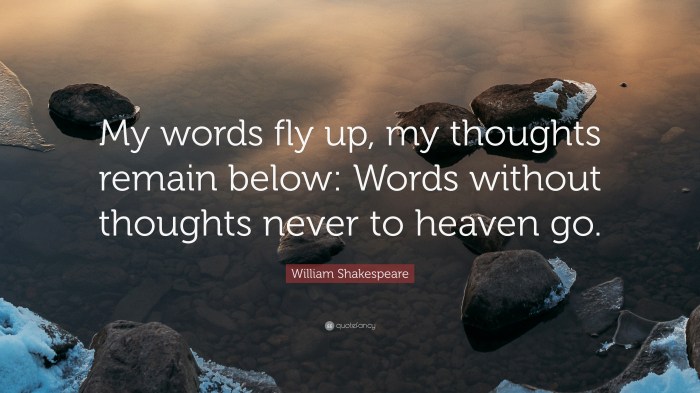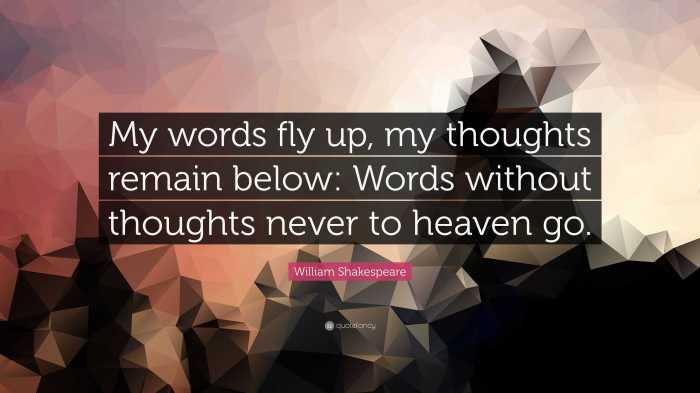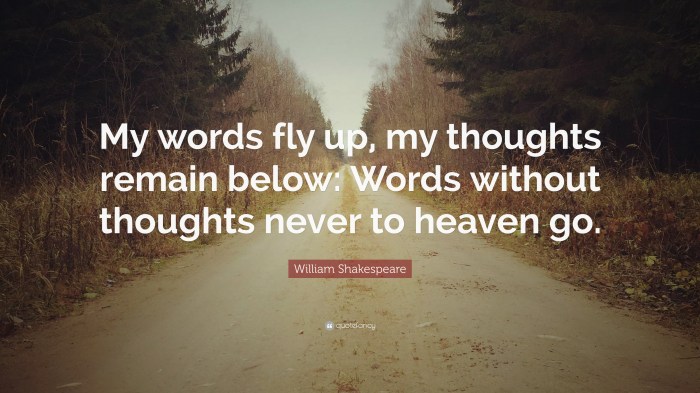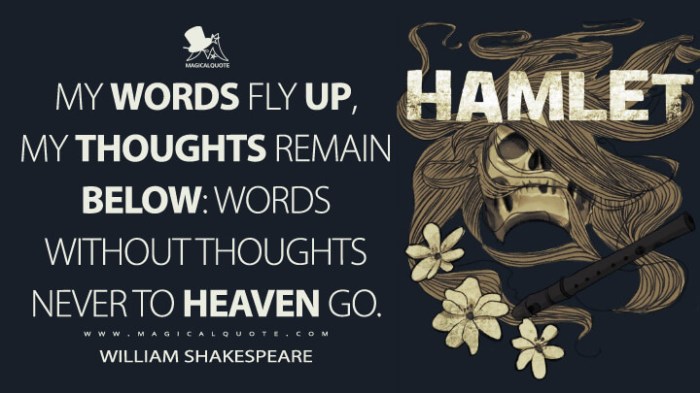My words fly up hamlet – In Shakespeare’s iconic tragedy, Hamlet’s words take flight, carrying profound meanings that shape the play’s narrative and characters. “My words fly up, my thoughts remain below,” uttered by the titular prince, encapsulates the essence of his complex inner world and the profound themes explored in his speech.
Hamlet’s words serve as a mirror into his psyche, revealing his sharp wit, philosophical musings, and emotional turmoil. Through literary devices such as metaphors, similes, and soliloquies, he expresses his doubts, fears, and desires, inviting readers to delve into the depths of his character.
Hamlet’s Words and Their Significance: My Words Fly Up Hamlet

Hamlet’s words are central to the play, driving the plot, revealing character, and exploring profound themes.
The phrase “my words fly up” encapsulates the significance of Hamlet’s language. His words soar beyond the mundane, carrying weight and meaning that shape the play’s events and characters.
The Power of Words
Hamlet’s words possess transformative power, capable of inciting action, revealing truths, and shaping destinies. His soliloquies and witty banter expose the inner workings of his mind and the hypocrisy of those around him.
Metaphorical Significance
The phrase “my words fly up” evokes the idea of words as birds taking flight, ascending beyond the confines of ordinary speech. Hamlet’s words transcend their literal meanings, becoming symbols of his aspirations, struggles, and insights.
While my words fly up to the clouds like Hamlet’s soliloquies, they often fail to add up. Fortunately, I’ve discovered a secret weapon: How To Sum In Excel . With this Excel guide, my numbers now dance in perfect harmony, just like the words in my mind.
Literary Devices in Hamlet’s Speech

Hamlet’s speeches are renowned for their use of literary devices that enhance their depth and impact. These devices allow Shakespeare to convey complex emotions, create vivid imagery, and underscore the play’s themes.
Similes
- “As swift as meditation or the thoughts of love”
This simile compares the speed of Hamlet’s thoughts to the swiftness of meditation or love, emphasizing the intensity and fleeting nature of his emotions.
- “Like a mildew’d ear, blasting his wholesome brother”
Hamlet compares Claudius’s corrupting influence on King Hamlet to a mildew that blights a healthy ear of corn, highlighting the destructive nature of his actions.
Metaphors
- “The time is out of joint; O cursed spite, / That ever I was born to set it right!”
Hamlet’s metaphor of the “time” being “out of joint” suggests a world in disarray and chaos, emphasizing the overwhelming task he faces in seeking justice.
- “This most excellent canopy, the air, look you, this brave o’erhanging firmament, this majestical roof fretted with golden fire—why, it appears no other thing to me than a foul and pestilent congregation of vapours.”
Hamlet’s description of the sky as a “foul and pestilent congregation of vapours” reflects his disillusionment with the world and his perception of it as corrupt and polluted.
Hamlet’s Character and Inner Conflict
Hamlet’s words are a window into his complex and tormented soul. Through his soliloquies and dialogues, we gain insights into his character and the inner conflict that rages within him.
Hamlet is a deeply introspective and thoughtful individual. His words reveal his intelligence, his wit, and his capacity for profound reflection. He is also a deeply emotional character, and his words often express his grief, anger, and despair.
Hamlet’s Indecisiveness and Procrastination
One of the most striking aspects of Hamlet’s character is his indecisiveness and procrastination. He is constantly debating the best course of action, and he often delays taking action until it is too late.
- For example, Hamlet knows that he must avenge his father’s death, but he hesitates to do so because he is unsure whether Claudius is truly guilty.
- His indecisiveness leads to a number of tragic consequences, including the deaths of Ophelia, Polonius, and Gertrude.
Hamlet’s Tragic Flaw
Hamlet’s tragic flaw is his inability to act decisively. This flaw is ultimately responsible for his downfall and the tragic events that befall him.
- If Hamlet had been more decisive, he could have avenged his father’s death and saved the lives of his loved ones.
- However, his inability to act decisively leads to his own death and the destruction of his family.
Hamlet’s Words and Actions, My words fly up hamlet
Hamlet’s words and actions are often at odds with each other. He is a man of great intellect and eloquence, but he is also a man of action.
- For example, Hamlet is capable of delivering powerful speeches about the importance of revenge, but he is also capable of hesitating and procrastinating when it comes to actually taking action.
- This conflict between Hamlet’s words and actions reveals the complex and contradictory nature of his character.
Themes Explored in Hamlet’s Speech

Hamlet’s speeches are renowned for their profound exploration of various themes that contribute to the play’s overarching message. These themes include:
Mortality and the Meaning of Life
Hamlet’s soliloquies often grapple with the inevitability of death and the brevity of human existence. Through his contemplation of mortality, he questions the purpose and meaning of life, highlighting the existential dilemmas that plague humanity.
Revenge and Justice
The theme of revenge is central to Hamlet’s character and drives the plot of the play. Hamlet’s desire for vengeance against Claudius for murdering his father consumes him, leading him to question the morality of his actions and the consequences of seeking justice.
Betrayal and Deception
Hamlet’s world is filled with betrayal and deception. The play explores the devastating effects of treachery on individuals and relationships, highlighting the corrosive nature of deceit and the difficulty of discerning truth from falsehood.
Madness and Sanity
Hamlet’s feigned madness becomes a complex and ambiguous aspect of his character. The play blurs the lines between sanity and insanity, raising questions about the nature of mental illness and the ways in which it can both reveal and conceal the truth.
Free Will and Fate
Hamlet’s struggle with his own choices and the forces that seem to shape his destiny is a recurring theme. The play explores the interplay between free will and fate, questioning the extent to which individuals have control over their own lives.
These themes intertwine throughout Hamlet’s speeches, creating a rich tapestry of ideas that resonate with audiences centuries after the play was written. They contribute to the play’s timeless appeal and continue to provoke contemplation and discussion about the fundamental questions of human existence.
Comparisons to Other Characters’ Speeches
Hamlet’s speeches are often characterized by their eloquence, wit, and philosophical depth. In comparison to the speeches of other characters in the play, Hamlet’s language is more elevated and poetic. He frequently employs metaphors, similes, and other literary devices to create vivid and memorable images.
Hamlet vs. Claudius
Claudius’s speeches are more straightforward and pragmatic. He often uses short, simple sentences to convey his thoughts and intentions. In contrast, Hamlet’s speeches are often long and winding, as he explores complex ideas and emotions.
Hamlet vs. Polonius
Polonius’s speeches are often characterized by their long-windedness and pedantry. He frequently uses convoluted language and obscure references to demonstrate his intelligence. Hamlet, on the other hand, is more direct and to the point in his speech.
Hamlet vs. Ophelia
Ophelia’s speeches are often characterized by their simplicity and sincerity. She speaks in a straightforward manner, expressing her thoughts and emotions without artifice. Hamlet, on the other hand, is more complex and ambiguous in his speech, often using wordplay and irony to convey his meaning.Overall,
Hamlet’s speeches stand out from those of the other characters in the play due to their eloquence, wit, and philosophical depth. He is a master of language, using it to explore complex ideas and emotions in a way that is both beautiful and thought-provoking.
Cultural and Historical Context

Hamlet’s speech is a product of its time, reflecting the cultural and historical context of Elizabethan England.
The play was written during a period of significant social and political change, as England emerged from the Middle Ages and into the Renaissance. This era was characterized by a renewed interest in classical learning, humanism, and the exploration of new worlds.
Language and Themes
The influence of Elizabethan England is evident in the play’s language and themes.
- Language:Hamlet’s speeches are rich in rhetorical devices, such as metaphors, similes, and puns, which were common in Elizabethan literature.
- Themes:The play explores themes of mortality, madness, and revenge, which were prevalent during this time of social and religious upheaval.
Key Questions Answered
What is the significance of Hamlet’s phrase “my words fly up”?
It represents the disconnect between his spoken words and his unspoken thoughts, highlighting the complexity of his inner world.
How do Hamlet’s words reveal his character?
His speech reveals his intelligence, wit, and emotional depth, as well as his struggles with doubt, indecision, and melancholy.
What are some of the literary devices used in Hamlet’s speech?
Metaphors, similes, soliloquies, and rhetorical questions are among the literary devices employed to convey his thoughts and emotions.